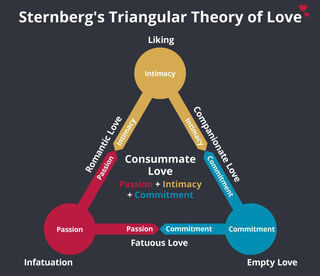Relationships
What Not to Binge? Relationships
Relationships aren’t like Netflix shows.
Posted July 12, 2021 Reviewed by Davia Sills
Key points
- Two people dating ideally move at the same speed, whatever speed that is.
- Taking things slow ensures that the relationship is built on key components of healthy human relationships: passion, commitment, and intimacy.
- Communicating without pressure or judgment can help partners stay in touch with where they each are in the relationship.

If you think about the early days of any of your previous dating experiences, you probably remember how amazing everything was—the spark you felt, how the other person made you feel, the infatuation that filled you. Your relationship was likely marked by very little conflict as you both felt enamored and totally in step with each other. But this is just a phase, a foundation for an even deeper connection, and it takes letting go and pacing yourself to foster something more meaningful and long-lasting.
Of course, you’ve heard all the advice before, and you’ve probably even given it: Take things slow. Let him text you first. You do you.
What makes this advice so difficult to take? The high of a new relationship can be borderline addictive, and as with any addiction, you can find yourself obsessed. Sometimes, this obsession is based on fear—fear that the other person will lose interest if you’re not on their mind, fear that the only thing keeping that spark alive is direct and continual contact.
The notion that less is actually more is a counterintuitive lesson to learn. It’s difficult to trust that in taking the risk to take space and pace yourself, the chance of the relationship being successful increases.
Relationship pacing
A lot of the people I work with come to me to understand just this—why it seems as though they’re in sync at the start of dating someone, but then, suddenly, one person is more interested than the other. And, usually, the person in my office is that person. Most importantly, two people dating ideally move at the same speed, whatever speed that is. But when one moves faster than the other, a misalignment can develop that can actually threaten the longevity of the relationship.
I find it helpful to equate their pattern of dating to binge-watching a Netflix show. When you find a new show to watch, you want to watch as many episodes as possible as quickly as possible because it’s new and exciting. It makes you feel good and happy. In relationships, you might find yourself texting more often and trying to make plans more frequently. Why would you want to slow down?
Engaging in an activity that you enjoy results in an increased production of dopamine, a chemical that promotes feelings of pleasure, excitement, and happiness (Northwestern Medicine, 2021), not unlike feelings in a relationship. But our brains crave these feelings more and more, resulting in continued bingeing and continued dopamine production. Over time, we need more stimulation in order for our brains to produce the same level of dopamine, leading to even more fervent efforts to feel good.
With Netflix, we watch more. In relationships, we try harder. And when the show ends with a series finale or the relationship ends with an unfortunate breakup, the result is a post-binge malaise (Scheiner, 2015). We crash and are left with feelings of emptiness, leading to high stress, depression, and confusion.
Clients of mine present with this confusion, often attributing this pattern as a comment on who they are and what they may offer in a relationship. They feel that they obviously must be flawed, since time after time, they are met with disinterest in romantic endeavors. More often than not, we can find that underlying motivators, such as fear and anxiety, drive their behaviors rather than genuine interest and security. While my clients may have developed feelings rather soon, their partners may have needed more time and space to do so.
Pacing yourself while dating, more akin to watching a cable television show week to week, helps alleviate some of the confusion should a relationship end. Being present for the relationship and taking the time to reflect as it pans out affords you the understanding of whether the two of you were truly compatible. You may even find appreciation for the relationship despite its ending. Research has indicated that binge-watching television shows actually produces a less enjoyable and memorable experience. The same would hold true for relationships.

Taking things slow also increases the chances for the relationship to last. It ensures that the relationship is built on the key components of healthy human relationships: passion, commitment, and intimacy (Sternberg, 1986). Sternberg maintains that rewarding and lasting relationships embody all three components, resulting in consummate love. Any other relationship marked by two or fewer of these elements is less likely to withstand time.
Here are some ideas that can help you pace yourself as you navigate the early days of dating:
1. Don’t do less; in fact, do more.
Trying to “play the game” and put less effort into the relationship will likely backfire. You’ll end up spending more mental energy thinking about the relationship, even if you are actively keeping your distance. As a result, your anticipation and excitement will continue to rise in the absence of contact, leading to some serious misalignment in the relationship.
Instead, do more and do differently for yourself. Fill your time with other activities and people as well. Work toward some balance so that your thoughts, feelings, and behavior are not all in one place.
2. Stay present.
It’s easy and even fun to let yourself fantasize about the what-ifs of the future. But too much of this can make you lose sight of what’s actually real. All you can know and make inferences from is the information at hand. Trying to read into texts and tone, while sometimes warranted, often leads to more anxiety and a greater chance of missing an actual cue as to the others’ feelings.
3. Check in with each other.
This is a relationship, after all. You both get to know what the other is thinking and feeling. Communication about where you are does not have to be a comment on commitment or the future. Approaching these conversations casually takes the pressure off both to predict what the other wants to hear. Hearing your partner’s thoughts is the only way to know if you both are aligned or not, whether the relationship could benefit from a change, or if there truly are healthy components to build on.
References
Northwestern Medicine. (2021). Binge Watching. https://www.nm.org/healthbeat/healthy-tips/emotional-health/binge-watch…
Schneier, M. (2015, December 5). The Post-Binge-Watching Blues: A Malady of Our Times. The New York Times. https://www.nytimes.com/2015/12/06/fashion/post-binge-watching-blues.ht…
Sternberg, R. J. (1986). A Triangular Theory of Love. Psychological Review 93(2), 119-135.




